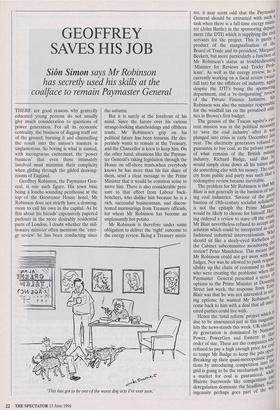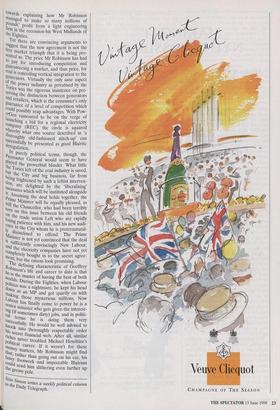GEOFFREY SAVES HIS JOB
Sion Simon says Mr Robinson
has secretly used his skills at the coalface to remain Paymaster General
THERE are good reasons why genteelly educated young persons do not usually give much consideration to questions of power generation. For all its economic centrality, the business of digging stuff out of the ground, burning it and channelling the result into the nation's toasters is unglamorous. So boring is what is named, with incongruous excitement, the 'power business' that even those intimately involved must minimise their complicity when gliding through the gilded drawing- rooms of England. Geoffrey Robinson, the Paymaster Gen- eral, is one such figure. His town base being a louche-sounding penthouse at the top of the Grosvenor House hotel, Mr Robinson does not strictly have a drawing- room to call his own in the capital. As he flits about his friends' expensively papered parlours in the more desirably residential parts of London, I doubt whether the mil- lionaire minister often mentions the 'ener- gy review' he has been conducting since the autumn.
But it is surely at the forefront of his mind. Since the furore over his various strange-looking shareholdings and offshore trusts, Mr Robinson's grip on his political future has been tenuous. He des- perately wants to remain at the Treasury, and the Chancellor is keen to keep him. On the other hand, situations like the Paymas- ter General's taking legislation through the House on off-shore trusts,when everybody knows he has more than his fair share of them, send a clear message to the Prime Minister that it would be common sense to move him. There is also considerable pres- sure to that effect from Labour back- benchers, who dislike him because he is a rich, successful businessman, and discon- tented murmurings from Treasury officials, for whom Mr Robinson has become an unpleasantly hot potato. Mr Robinson is therefore under some obligation to deliver the 'right' outcome to the energy review. Being a Treasury minis- `This has got to be one of the worst dog acts I've ever seen.' ter, it may seem odd that the Paymaster General should be entrusted with such a task when there is a full-time energy minis- ter (John Battle) in the sponsoring depart' ment (the DTI) which is supplying the civil servants for the project. This is partly a product of the marginalisation of the Board of Trade and its president, Margaret Beckett, but more particularly a function of Mr Robinson's status as troubleshooting `Minister for Reviews and Tricky Prob- lems'. As well as the energy review, he is currently working on a fiscal review (wind- fall tax) for the offshore oil industry, again despite the DTI's being the sponsoring department, and a 're-invigorating' review of the Private Finance Initiative. Mr Robinson was also the minister responsible for the windfall tax on the privatised utili- ties in Brown's first budget. The genesis of the Tuscan squire's cur- rent mission was in the political necessity to 'save the coal industry' after it was plunged into crisis in early December last year. The electricity generators refused to guarantee to buy coal, so the private owner of what remains of the British milling industry, Richard Budge, said that he, would simply close down all his mines and do something else with his money. The oa cry from public and party was such that a redemptive review became inevitable. The problem for Mr Robinson is that M Blair is not generally in the business of say' ing coal industries. 'Saviour of the great bastion of 19th-century socialist solidarity is not the epitaph the Prime Minister would be likely to choose for himself. Hai' ing ordered a review to stave off the crisp; Mr Blair nevertheless refused to accept any_ solution which could be interpreted as old. fashioned industrial interventionism. Who should sit like a steely-eyed Richelieu di; the Cabinet subcommittee monitoring th, review? Peter Mandelson. This meant that Mr Robinson could not get away with alW fudges. Nor was he allowed to push resP°a; sibility up the chain of command to tittle who were creating the problems: when la, Paymaster General presented a series 0` options to the Prime Minister at Downing Street last week, the response from Val Blair was that he was not interested in se", ing options; he wanted Mr Robinson 1,u, come back to him with a deal that all inter' ested parties could live with. Hence the 'total reform' project which se due to be announced just as this magaill3„ hits the news-stands this week. UK electri. ity generation is dominated by Natit; Power, PowerGen and Eastern in 'Lilo order of size. These are the companies vi,at refused to pay a high enough price for to tempt Mr Budge to keep the pits ope_LL Breaking up their quasi-monopolistic Pe, re . tu tions by introducing competition into .0 grid is going to be the mechanism by wIllje a market for coal is guaranteed, wu:d Blairite buzzwords like competition fcti , deregulation dominate the headlines. _.,1jav ingenuity perhaps goes part of the w towards explaining how Mr Robinson managed to make so many millions of Pounds' profit from a light engineering firm in the recession-hit West Midlands of the Eighties. Yet there are convincing arguments to suggest that the new agreement is not the free market triumph that it is being pre- sented as. The price Mr Robinson has had to pay for introducing competition and guaranteeing a market, and thus price, for coal is conceding vertical integration to the generators. Virtually the only sane aspect of the power industry as privatised by the Tories was the rigorous insistence on pre- serving the distinction between generators and retailers, which is the consumer's only guarantee of a level of competition which could possibly reap advantages. With Pow- erGen rumoured to be on the verge of launching a bid for a regional electricity company (REC), the circle is squared whereby what one source described as 'a thorouly old-fashioned stitch-up' can successfully be presented as good Blairite deregulation. In purely political terms, though, the Paymaster General would seem to have Played the proverbial blinder. What little the Tories left of the coal industry is saved, b. ut the City and big business, far from being frightened by such a leftist interven- tion, are delighted by the 'liberalising' Measures which will be instituted alongside it. Assuming the deal holds together, the /lime Minister will be equally pleased, as Will the Chancellor, who had been terribly torn on this issue between his old friends iins.on the trade union Left who are rapidly los r. patience with him, and his new audi- ence in the City whom he is preternatural- ly disinclined to offend. The Prime Minister is not yet convinced that the deal Is sufficiently convincingly New Labour, and the elecricity companies have not yet completely bought in to the secret agree- ment, but the omens look promising. The defining characteristic of Geoffrey he life and career to date is that Ile is the master of having the best of both Worlds. During the Eighties, when Labour politics was a nightmare, he kept his head ciciwil as an MP and got quietly on with making those mysterious millions. Now Iabour has finally come to power he is a senior minister who gets given the interest- ing (if sometimes dirty) jobs, and in politi- cal terms he is doing them very 811_ecessfully. He would be well advised to , nek into thoroughly respectable order has secret financial web. After all, similar riches never troubled Michael Heseltine's Political career. If it weren't for these money matters, Mr Robinson might find that, rather than going out on his ear, his fancy footwork and impeccable Blairism ctould send him slithering even further up Could pole.
Sion Simon writes a weekly political column in the Daily Telegraph.



































































 Previous page
Previous page